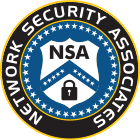Data indicates that approximately 43 percent of cyber-attacks specifically target small businesses. Small businesses are particularly susceptible to data breaches due to intentional or inadvertent mishaps regarding network security.
The financial costs related to a data breach extend beyond the steps necessary to correct the breach. Many customers also take their business elsewhere after a breach, due to concerns over network security. Estimates state 60% of small businesses cease operations within 6 months after a cyber-attack.
Steps to Take to Maintain a High Level of Network Security
1. Activate Two-Factor Authentication
Two-factor authentication should be enabled when possible to make it harder for virtual thieves to log into your accounts. Here’s how two-factor authentication works: once you input your password, you’re sent a unique code to a device or account only you have access to.
For example, you might receive a text message to your mobile device. You then have to input the code to resume logging on. If a hacker can crack your password, two-factor 
It also acts as a notification if someone is trying to log into your accounts. You’ll know something is wrong if you receive an alert or message regarding an account you aren’t trying to access.
2. Fortify Your Browser Privacy
You should take multiple steps to maximize the privacy of your internet browser. Not only does this make it more difficult for thieves to steal private information, but it also protects your browser privacy.
Start by using a virtual private network (VPN) to keep your data secure when accessing the internet or sharing information via a potentially unsecured connection. You should also make sure that you only visit websites that start with “https.” This indicates the site has an SSL certificate to encrypt user activity and information, keeping them secure.
Add a firewall to your devices. A firewall prevents potentially dangerous visitors from accessing your website; it does so by acting according to a set of rules and stipulations regarding visitor traffic that you provide. You can also use the firewall to protect your email account.
3. Bolster Your Passwords
Make sure you password-protect all possible accounts and take steps to use strong passwords. Though a hard-to-guess password on its own doesn’t offer optimal network security, it’s a great first-level of protection.
You should avoid using passwords that incorporate personal and easy-to-find information, like your hobbies, favorite sports team, birthdate, or social security number. A hacker who steals your info will likely be able to easily guess your passwords. See that your passwords use a combination of numbers, characters and letters. It’s also important to regularly change them. Avoid writing them down, and never share them with other individuals.
Network Security Associates can help keep your data safe with ‘round-the-clock monitoring. We offer a variety of services to ensure you receive maximum network security at all times. Call 702-547-9800 to schedule a network security assessment today.

